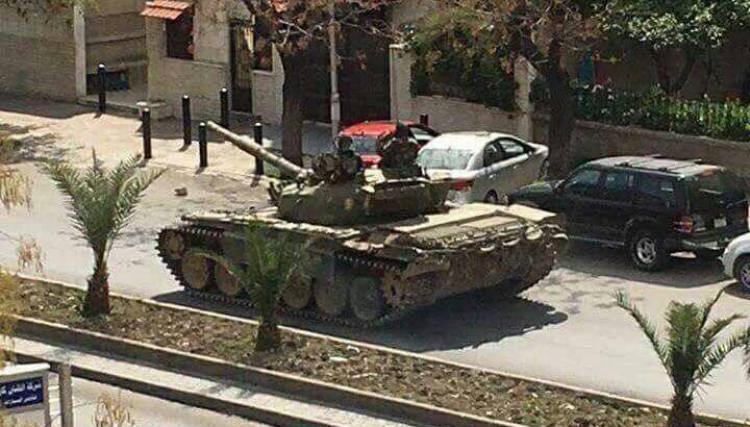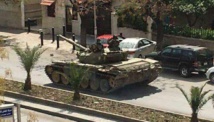But forces loyal to President Bashar al-Assad drove them back by nightfall and began a fierce bombing campaign on Monday morning, a monitor said.
"There have been intense air strikes since dawn on opposition-held positions in Jobar from which the offensive was launched," said Rami Abdel Rahman, head of the Syrian Observatory for Human Rights.
"The government and allied forces have retaken the initiative and are striking the groups that launched yesterday's assault," he added.
Abdel Rahman said it was unclear whether regime forces or their Russian allies were carrying out Monday's raids on Jobar.
Control of the district -- which has been a battleground for more than two years and is the closest rebel position to the heart of Damascus -- is divided between rebels and allied jihadists on one side, and government forces on the other.
Media activists in Jobar said at least 40 raids had targeted the neighbourhood since dawn, releasing footage of a cloud of black smoke enveloping heavily damaged buildings.
On Sunday, opposition fighters seized several buildings in Jobar before advancing into the neighbouring Abbasid Square area -- the first time in two years the opposition had broken into that district.
The clashes killed at least 26 members of regime forces and 21 rebels and jihadists, Abdel Rahman said. He did not have an immediate toll for Monday morning's air strikes.
- Roads reopened -
Sniper fire and air strikes were heard across the city on Sunday as civilians cowered inside their homes and schools announced they would close because of the violence.
By Monday, the front line had been pushed back and AFP correspondents said activity in the typically bustling Abbasid Square was returning to normal levels.
Residents near the Abbasid Square bus station, which regime forces retook from rebels, stood on their balcony surveying the damage from the latest clashes.
Inside the station, several soldiers could be seen curled up under a blanket, taking a mid-morning nap after hours of heavy fighting.
Planes could still be heard above the city but many of the roads that had been sealed off by army troops the previous day were reopened.
According to the Observatory, government forces managed to recapture "70 percent of the territory" overrun by rebels in the capital and were attacking the remaining rebel-held positions between Jobar and the opposition's Qabun district to the north.
While the strategic objective of Sunday's offensive is unclear, observers say a possible goal was breaking the government's siege of Qabun.
"In their assault yesterday, rebels were able to open a road for several hours between Qabun and Jobar, but the area is now a front line and they can no longer cross between the two," Abdel Rahman said.
- New peace talks due -
State news agency SANA said Syrian government troops were targeting rebel bases around Jobar on Monday.
"The military operations north of Jobar targeted the areas from which the terrorists set out, and a large number of them were killed," it said.
The agency reported that opposition fighters on Sunday bombarded the Russian embassy compound in the capital's Mazraa neighbourhood but that there were no casualties.
The Islamist Faylaq al-Rahman rebel group and the Fateh al-Sham Front -- known as Al-Nusra Front before it renounced its ties to Al-Qaeda -- have a presence in Jobar.
Syria's conflict erupted in March 2011 with protests against Assad's rule but has evolved over the years into a complex civil war.
More than 320,000 people have been killed and millions more have been displaced by the conflict.
In recent months, the regime has sought to secure territory around the capital with renewed offensives on besieged rebel towns along with local "reconciliation" deals.
The war saw a turning point when Russia intervened in September 2015 in support of the regime, allowing pro-government forces to regain significant territory they had lost to the rebels.
The retaking of all of second city Aleppo late last year was a major blow to the opposition.
Repeated peace talks over the years have failed to bring about a political solution to the conflict. Another round of negotiations is due to begin in Geneva on Thursday.
-------------------------------------------------------------------------------------------------------
"There have been intense air strikes since dawn on opposition-held positions in Jobar from which the offensive was launched," said Rami Abdel Rahman, head of the Syrian Observatory for Human Rights.
"The government and allied forces have retaken the initiative and are striking the groups that launched yesterday's assault," he added.
Abdel Rahman said it was unclear whether regime forces or their Russian allies were carrying out Monday's raids on Jobar.
Control of the district -- which has been a battleground for more than two years and is the closest rebel position to the heart of Damascus -- is divided between rebels and allied jihadists on one side, and government forces on the other.
Media activists in Jobar said at least 40 raids had targeted the neighbourhood since dawn, releasing footage of a cloud of black smoke enveloping heavily damaged buildings.
On Sunday, opposition fighters seized several buildings in Jobar before advancing into the neighbouring Abbasid Square area -- the first time in two years the opposition had broken into that district.
The clashes killed at least 26 members of regime forces and 21 rebels and jihadists, Abdel Rahman said. He did not have an immediate toll for Monday morning's air strikes.
- Roads reopened -
Sniper fire and air strikes were heard across the city on Sunday as civilians cowered inside their homes and schools announced they would close because of the violence.
By Monday, the front line had been pushed back and AFP correspondents said activity in the typically bustling Abbasid Square was returning to normal levels.
Residents near the Abbasid Square bus station, which regime forces retook from rebels, stood on their balcony surveying the damage from the latest clashes.
Inside the station, several soldiers could be seen curled up under a blanket, taking a mid-morning nap after hours of heavy fighting.
Planes could still be heard above the city but many of the roads that had been sealed off by army troops the previous day were reopened.
According to the Observatory, government forces managed to recapture "70 percent of the territory" overrun by rebels in the capital and were attacking the remaining rebel-held positions between Jobar and the opposition's Qabun district to the north.
While the strategic objective of Sunday's offensive is unclear, observers say a possible goal was breaking the government's siege of Qabun.
"In their assault yesterday, rebels were able to open a road for several hours between Qabun and Jobar, but the area is now a front line and they can no longer cross between the two," Abdel Rahman said.
- New peace talks due -
State news agency SANA said Syrian government troops were targeting rebel bases around Jobar on Monday.
"The military operations north of Jobar targeted the areas from which the terrorists set out, and a large number of them were killed," it said.
The agency reported that opposition fighters on Sunday bombarded the Russian embassy compound in the capital's Mazraa neighbourhood but that there were no casualties.
The Islamist Faylaq al-Rahman rebel group and the Fateh al-Sham Front -- known as Al-Nusra Front before it renounced its ties to Al-Qaeda -- have a presence in Jobar.
Syria's conflict erupted in March 2011 with protests against Assad's rule but has evolved over the years into a complex civil war.
More than 320,000 people have been killed and millions more have been displaced by the conflict.
In recent months, the regime has sought to secure territory around the capital with renewed offensives on besieged rebel towns along with local "reconciliation" deals.
The war saw a turning point when Russia intervened in September 2015 in support of the regime, allowing pro-government forces to regain significant territory they had lost to the rebels.
The retaking of all of second city Aleppo late last year was a major blow to the opposition.
Repeated peace talks over the years have failed to bring about a political solution to the conflict. Another round of negotiations is due to begin in Geneva on Thursday.
-------------------------------------------------------------------------------------------------------









 Home
Home Politics
Politics











